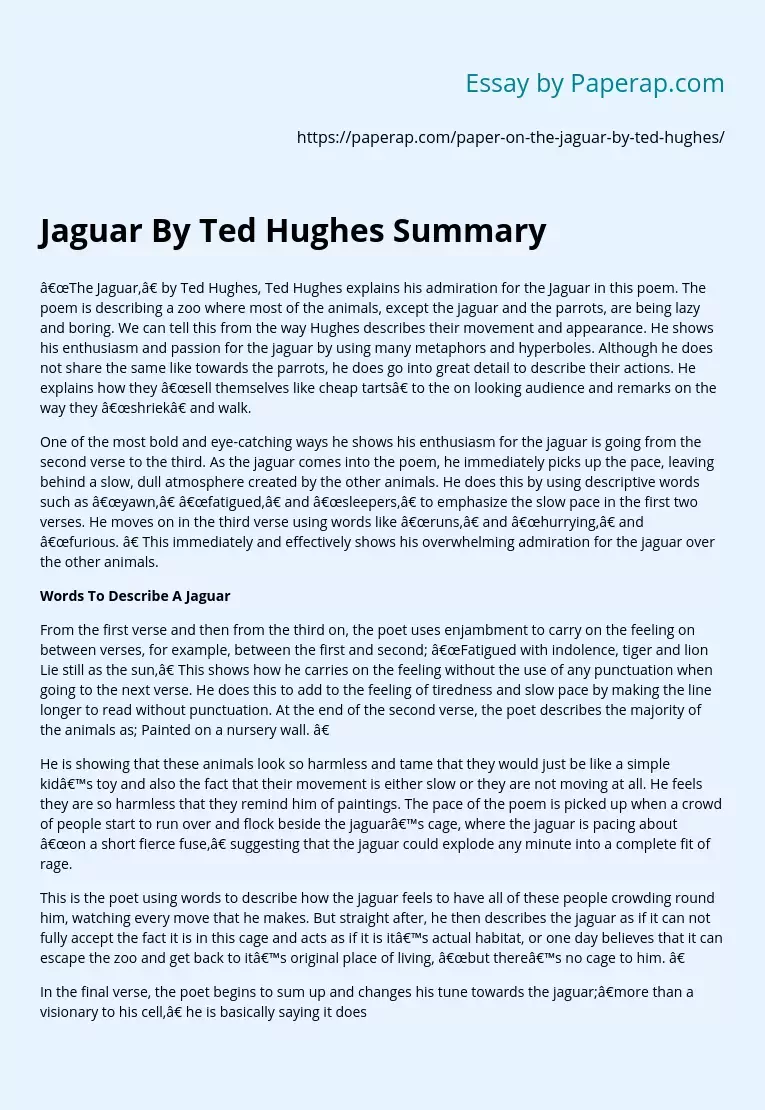Jaguar By Ted Hughes Summary
“The Jaguar,” by Ted Hughes, Ted Hughes explains his admiration for the Jaguar in this poem. The poem is describing a zoo where most of the animals, except the jaguar and the parrots, are being lazy and boring. We can tell this from the way Hughes describes their movement and appearance. He shows his enthusiasm and passion for the jaguar by using many metaphors and hyperboles. Although he does not share the same like towards the parrots, he does go into great detail to describe their actions.
He explains how they “sell themselves like cheap tarts” to the on looking audience and remarks on the way they “shriek” and walk.
One of the most bold and eye-catching ways he shows his enthusiasm for the jaguar is going from the second verse to the third. As the jaguar comes into the poem, he immediately picks up the pace, leaving behind a slow, dull atmosphere created by the other animals. He does this by using descriptive words such as “yawn,” “fatigued,” and “sleepers,” to emphasize the slow pace in the first two verses.
He moves on in the third verse using words like “runs,” and “hurrying,” and “furious. ” This immediately and effectively shows his overwhelming admiration for the jaguar over the other animals.
Words To Describe A Jaguar
From the first verse and then from the third on, the poet uses enjambment to carry on the feeling on between verses, for example, between the first and second; “Fatigued with indolence, tiger and lion Lie still as the sun,” This shows how he carries on the feeling without the use of any punctuation when going to the next verse.
He does this to add to the feeling of tiredness and slow pace by making the line longer to read without punctuation. At the end of the second verse, the poet describes the majority of the animals as; Painted on a nursery wall. ”
He is showing that these animals look so harmless and tame that they would just be like a simple kid’s toy and also the fact that their movement is either slow or they are not moving at all. He feels they are so harmless that they remind him of paintings. The pace of the poem is picked up when a crowd of people start to run over and flock beside the jaguar’s cage, where the jaguar is pacing about “on a short fierce fuse,” suggesting that the jaguar could explode any minute into a complete fit of rage.
This is the poet using words to describe how the jaguar feels to have all of these people crowding round him, watching every move that he makes. But straight after, he then describes the jaguar as if it can not fully accept the fact it is in this cage and acts as if it is it’s actual habitat, or one day believes that it can escape the zoo and get back to it’s original place of living, “but there’s no cage to him. ”
In the final verse, the poet begins to sum up and changes his tune towards the jaguar;”more than a visionary to his cell,” he is basically saying it does not care about who or what is around it; it is just looking to the future. He adds to his feelings for the jaguar by exaggerating somewhat how the crowds are just waiting to see what he will do next, “the world rolls over the thrust of his heel. ” Here, the poet is using hyperbole to exaggerate his feelings towards the jaguar and make out as if the jaguar is the most important thing in the world at that time, when quite simply it is no where near.
In this poem, the poet, Ted Hughes expresses his enthusiasm towards the subject by describing the jaguar’s superiority over the other animals in the zoo. All of this is extremely effective in aiding his description and highlighting the uniqueness of the jaguar to the rest. Overall this poem gave good decisive descriptions of movement and of setting and showed the poets likes and dislike towards animals clearly and understandably.
Jaguar By Ted Hughes Summary. (2019, Dec 05). Retrieved from https://paperap.com/paper-on-the-jaguar-by-ted-hughes/

